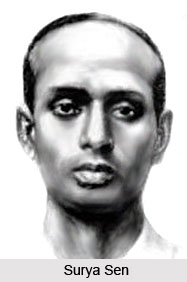 The Chittagong Armoury Raid Case was still another startling and most daring revolutionary endeavour by the youth. The well-devised raid was conducted on 18th April 1930, with Surya Sen, a committed revolutionary, as the leader of the group. At about 10.00 p.m. about a hundred youths clad in Khaki, marched in military order in several groups in chorus. One of their batches raided the telephone exchange and telegraph office and cut off all communications connecting the town with Calcutta and Dacca. The second one severed rail connections at Nangalkot and Dham, which resulted in the derailment of some goods trains and the resultant blockading of all railway traffic. The third one raided the premises of the club, but failing to find any of the officials there, joined the main group. At the same time, leaflets were distributed all over the town explaining the object of the raid. These were signed by Surya Sen as the president of the `Indian Republican Army, Chittagong branch`.
The Chittagong Armoury Raid Case was still another startling and most daring revolutionary endeavour by the youth. The well-devised raid was conducted on 18th April 1930, with Surya Sen, a committed revolutionary, as the leader of the group. At about 10.00 p.m. about a hundred youths clad in Khaki, marched in military order in several groups in chorus. One of their batches raided the telephone exchange and telegraph office and cut off all communications connecting the town with Calcutta and Dacca. The second one severed rail connections at Nangalkot and Dham, which resulted in the derailment of some goods trains and the resultant blockading of all railway traffic. The third one raided the premises of the club, but failing to find any of the officials there, joined the main group. At the same time, leaflets were distributed all over the town explaining the object of the raid. These were signed by Surya Sen as the president of the `Indian Republican Army, Chittagong branch`.
The vehicle carrying Ananta Singh and Ganesh Ghosh were followed by the vehicle carrying Surya Sen. The revolutionaries were able to seize the armouries and a gigantic amount of arms and ammunition. Every task was carried out according to the plan and Surya Sen was given a guard of honour. Kalpana Dutt, herself a great revolutionary and a member of this group of revolutionaries, has given the detailed account of the Chittagong Armoury Raid Case in her book, Chittagong Armoury Raiders. Major Forrel was killed and despite their position of inconvenience, the revolutionaries were able to throw back the government forces. The government acquired reinforcements in Chittagong on 20th April 1930. They opened the attack again on 22nd April 1930. After causalities on both sides, the revolutionaries dispersed during the night and continued the guerrilla fights in different localities.
Apart from the minor clashes, another major confrontation occurred on 6th May when Debi Prasad Gupta, Manoranjan Sen, Rajat Sen, Swadesh Roy, Phanindra Nandi and Subodh Chaudhary came out with the intention of attacking the European quarters along the riverbank. But the plan backfired and four of them were killed while the other two, Subodh and Phani were wounded and arrested. Large-scale arrests were made. The revolutionaries were booked in a criminal case known as `Chittagong Armoury Raid Case`. In July 1930, prosecution was launched against thirty-two revolutionaries. A Special Tribunal was appointed and the chief charge against them was `waging war against the King Emperor`. Judgement was delivered on 1st March 1932. Thirteen of them were sentenced to expatriation for life, short-term imprisonments were awarded to Nandulal Singh and Anilbandhu Das, and sixteen were acquitted. But the revolutionaries continued their attacks and those who were arrested were given unkind punishments in sham trials.
Surya Sen was arrested in February 1933, while Kalpana Dutt and Tarakeshwar Dastidar were captured on 19th May 1933. In June 1933, a supplementary Armoury Raid Case was put up for trial in which Surya Sen and Tarakeshwar Dastidar were sentenced to death, while Kalpana Dutt was sentenced to transportation for life vide judgement dated 14th August 1933.
Surya Sen kissed the gallows on the night of 12th January 1934 in Chittagong jail, with his last message of "ideal and unity" and "a golden dream...a dream of free India", wishing his comrades the strength to fight for freedom and ending his forceful epistle with the slogan of `Vande Mataram` and reminding the nation never to forget the eastern revolution of Jalalabad, Julda, Chandan Nagar and Dhal Ghat waged on 18th April 1930. Ganesh Ghose, Haripad Bhattacharya, Faqir Chandra Sen Gupta, Himangshu Bhowmik, Kali Kinker Dey, Lai Mohan Sen, Phanindra Lai Nandi, Randhir Das Gupta, Sahay Ram Das, Subodh Kumar Choudhari, Subodh Roy, Sudhir Ranjan Choudhari, Kalipada Chakravarty and Sukhdendu Dastidar were deported to the Andamans, in concern with the Chittagong Armoury Raid Case.
The Chittagong group was undisputedly recognised as the best and the most successful group that Bengal`s revolutionaries had ever organised.






































